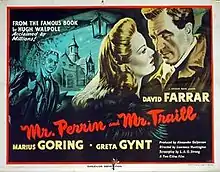Mr. Perrin and Mr. Traill
Mr. Perrin and Mr. Traill is a 1948 British drama film directed by Lawrence Huntington and starring Marius Goring, David Farrar, Greta Gynt, Edward Chapman and Raymond Huntley. It is based on the 1911 novel of the same title by Hugh Walpole. Walpole based the novel on his experiences as a teacher at Epsom College, but shifted the school's setting to the Cornish coast.
| Mr. Perrin and Mr. Traill | |
|---|---|
 | |
| Directed by | Lawrence Huntington |
| Written by |
|
| Produced by | Alexander Galperson |
| Starring | |
| Cinematography | Erwin Hillier |
| Edited by | Ralph Kemplen |
| Music by | Allan Gray |
Production company | |
| Distributed by | |
Release date | 25 August 1948 |
Running time | 92 minutes |
| Country | United Kingdom |
| Language | English |
| Budget | £190,700[1] |
| Box office | £86,100[1] |
Plot
The comfortable but lonely world of a middle-aged schoolmaster, "Pompo" Perrin, is upset when a new colleague arrives and proves popular with the boys, if impatient with petty school norms. The school, part of an isolated cliffside community in Cornwall, is a minor private one run by a headmaster who is somewhat sadistic and threatening towards his staff. Perrin's frustration deepens as Traill, the younger man, who has seen action in the war and is more worldly and confident, begins a relationship with an attractive school nurse, with whom Perrin has for some time been enamoured. Perrin feels himself increasingly undermined and humiliated at work, and losing his connection to his pupils. He slides into resentment and depression. He develops fantasies of violence against his perceived enemy, leading to a tragic conclusion.[2]
Cast
- Marius Goring as Vincent Perrin
- David Farrar as David Traill
- Greta Gynt as Isobel Lester
- Raymond Huntley as Moy-Thompson
- Edward Chapman as Birkland
- Mary Jerrold as Mrs. Perrin
- Ralph Truman as Comber
- Finlay Currie as Sir Joshua Varley
- Maurice Jones as Clinton
- Lloyd Pearson as Dormer
- May MacDonald as Mrs. Dormer
- Viola Lyel as Mrs. Comber
- Pat Nye as Matron
Reception
The film earned producer's receipts of £67,200 in the UK and £18,900 overseas.[1]
References
- Chapman, J. (2022). The Money Behind the Screen: A History of British Film Finance, 1945-1985. Edinburgh University Press p 354. Income is in terms of producer's share of receipts.
- BFI.org